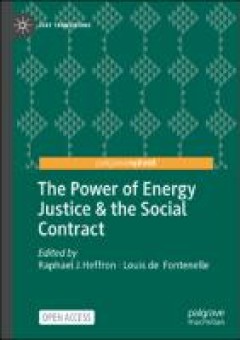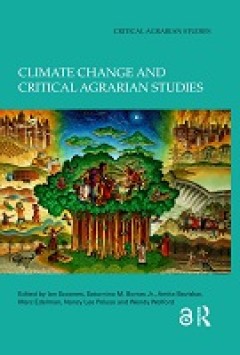Ditapis dengan
E-book Energy Poverty, Practice, and Policy
Energy poverty refers to issues that span access to energy, energy depri-vation, and its under-use within daily life. Broadly, the central concern ofresearch and policy in this space is with the negative outcomes that a lackof energy use has for wellbeing. Within the UK and many other globalcontexts, the focus has often been on those that cannot afford to heattheir homes, with solutions posed a…
- Edisi
- -
- ISBN/ISSN
- 9783030994327
- Deskripsi Fisik
- 144 hlm
- Judul Seri
- -
- No. Panggil
- 333.7 BUT e
E-book Sustainable Cities: for People and Planet
The rapid transformation of the world through urbanization has been a defining feature of the last century. This shift has elevated cities into economic powerhouses that foster innovation, economic development, and social interactions. However, this has come at a cost: often prioritizing immediate economic gains, the fast and unplanned expansion of cities around the world has created a variety …
- Edisi
- -
- ISBN/ISSN
- -
- Deskripsi Fisik
- 18 halaman, ilus.
- Judul Seri
- -
- No. Panggil
- 696 GEF s

E-Book The Power of Energy Justice & the Social Contract
This book focuses on the energy sector and will make a significant contribution to its continued evolution. For many years, the energy sector has been missing a raison d’etre and now finally there are increased calls for that to be justice. Hence, this book will develop the concept of energy justice and how it needs to be formalised in a new ‘social contract’ with all stakeholders in soci…
- Edisi
- -
- ISBN/ISSN
- 9783031462825
- Deskripsi Fisik
- 273 halaman
- Judul Seri
- -
- No. Panggil
- 333.7 HEF t
E-book Theme Report on Energy Access : Towards the Achievement of SDG 7 and N…
Universal access to affordable, reliable, and modern energy services by 2030 (SDG 7.1) is a prerequisite and catalyst for improving the living and working conditions of all the world's people. The lack of access to modern energy is a barrier to achieving several other SDGs, especially for the poorest and most vulnerable populations. Receiving access to modern energy helps people lift themselves…
- Edisi
- -
- ISBN/ISSN
- -
- Deskripsi Fisik
- 77 hlm
- Judul Seri
- -
- No. Panggil
- 531.6 UNI t
E-book Indonesia Energy Transition Outlook 2023
This boom in coal exports endangered Indonesia’s energy supply. To secure its national coal supply for power system, the government sets a Domestic Market Obligation (DMO) of USD 70/tonne, 3 times lower than the global price. There are also subsidies for other fossil fuels, such as the public fund’s allocation of IDR 77.5 trillion for subsidizing fuel oil and LPG in 2022. Due to such regula…
- Edisi
- -
- ISBN/ISSN
- -
- Deskripsi Fisik
- 122 hlm
- Judul Seri
- -
- No. Panggil
- 531.6 BAG i

E-Book Climate Change and Critical Agrarian Studies
Climate change is perhaps the greatest threat to humanity today and plays out as a cruel engine of myriad forms of injustice, violence and destruction. The effects of climate change from human-made emissions of greenhouse gases are devastating and accelerating; yet are uncertain and uneven both in terms of geography and socio-economic impacts. Emerging from the dynamics of capitalism since the …
- Edisi
- -
- ISBN/ISSN
- 9781032741673
- Deskripsi Fisik
- 679 halaman
- Judul Seri
- -
- No. Panggil
- 333.7 SCO c
E-book Hydropower Technologies : The State of the Art
Since the late 19th century, hydropower has developed as a clean, safe, reliable and inexpensive source of power and energy service. Hydropower generation corresponds to about 12% of the European net electricity generation and 36% of electricity from renewable resources in Europe (EUROSTAT, 2019). Hydropower is technically mature and is usually economically competitive under liberalized market …
- Edisi
- -
- ISBN/ISSN
- -
- Deskripsi Fisik
- 87 hlm
- Judul Seri
- -
- No. Panggil
- 531.6 EUR h
E-book The Birth of Energy : Fossil fuels, Thermodynamics and the Politics of…
Intensive energy consumption is necessary to the good life. At least that is ExxonMobil’s outlook for energy in their “View to 2040,” quoted above. As global warming becomes more difficult to ignore, oil and gas titans increasingly want to brand themselves as energy companies that supply much-needed power to the people, rather than as fossil fuel extractors…
- Edisi
- -
- ISBN/ISSN
- 9781478005346
- Deskripsi Fisik
- 281 hlm
- Judul Seri
- -
- No. Panggil
- 333.7 DAG t
E-book From efficiency to reduction : Tackling energy consumption in a cross …
In 2018, CO2 emissions from fossil-based energy sources have reached another historical record, of about 37.1 tonnes of CO2 a year, with an even worse prognosis for 2019. After a small stabi-lizing period between 2015 and 2016, CO2 in the air has just been increasing approximately 1% each year despite that the share of renewable energies has been increasing worldwide. These figures outline the …
- Edisi
- -
- ISBN/ISSN
- -
- Deskripsi Fisik
- 183 hlm
- Judul Seri
- -
- No. Panggil
- 531.6 BOZ f
E-book Living Planet Report 2020
The global Living Planet Index continues to decline. It shows anaverage 68% decrease in population sizes of mammals, birds, amphibians, reptiles and fish between 1970 and 2016. A 94% decline in the LPI for the tropical subregions of the Americas is the largest fall observed in any part of the world. Why does this matter? It matters because biodiversity is fundamental to human life on Earth, and…
- Edisi
- -
- ISBN/ISSN
- 9782940529995
- Deskripsi Fisik
- -
- Judul Seri
- -
- No. Panggil
- 333.7 AND l
 Karya Umum
Karya Umum  Filsafat
Filsafat  Agama
Agama  Ilmu-ilmu Sosial
Ilmu-ilmu Sosial  Bahasa
Bahasa  Ilmu-ilmu Murni
Ilmu-ilmu Murni  Ilmu-ilmu Terapan
Ilmu-ilmu Terapan  Kesenian, Hiburan, dan Olahraga
Kesenian, Hiburan, dan Olahraga  Kesusastraan
Kesusastraan  Geografi dan Sejarah
Geografi dan Sejarah